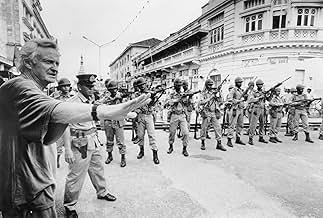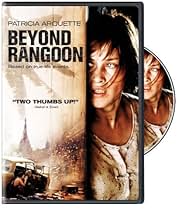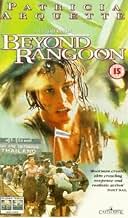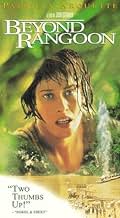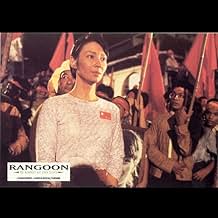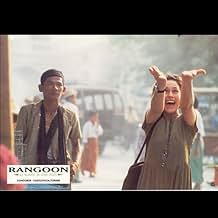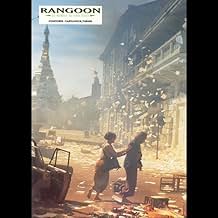IMDb-BEWERTUNG
6,5/10
5603
IHRE BEWERTUNG
Füge eine Handlung in deiner Sprache hinzuAn American tourist finds herself in the middle of a political uprising in Burma.An American tourist finds herself in the middle of a political uprising in Burma.An American tourist finds herself in the middle of a political uprising in Burma.
- Regie
- Drehbuch
- Hauptbesetzung
- Auszeichnungen
- 2 Gewinne & 3 Nominierungen insgesamt
Kuswadinata
- Colonel at Hotel
- (as Kuswadinath Bujang)
Empfohlene Bewertungen
John Boorman, I like your movies. Your movies are cerebral, but do not rely on symbolism or language to convey thought. They seem to rely on emotions, sometimes clichéd (not always a bad thing, and you do handle it well, in that your people say what one would expect a person to really say in that situation, even if it has that feel of a cliché), and lots of water and green vegetation, mud, earth, breath in the cold, dragon's breath, stuff like that.
Your films remind me of David Lean and David Attenborough, which makes sense, but, as you would probably agree, more dreamy.
A possible misgiving is an expectation set up with your stuff that right away tips me in a certain direction, and takes away possible surprise.
Not so with Beyond Rangoon, which I found was beyond the others you have done that I am most familiar with (Emerald Forest, which I need to see again, and Excalibur).
Beyond Rangoon is the story of one woman set against the backdrop of events in Myanmar (Burma). The story makes no attempt to give us a comprehensive picture of those events, just an introduction, but it is a solid introduction. I feel I know a lot more, and I have a sense of connection with those people that I did not have before, however tenuous from my place of privilege.
Overall I found the story moving and filled with meaning. I always like Patricia Arquette, and her leading man in this film is just great. Actually, she's the lead in this film, and that is what is great.
So much of the film is told with film language, that is, images, that I can see some critics being a little impatient with it, but it is probably because they overanalyze and find it fearful to feel anything too deeply.
Anyone out there wondering if this movie is worth it should watch it to find out. It will not be a waste of your time, whether you like it or not.
Your films remind me of David Lean and David Attenborough, which makes sense, but, as you would probably agree, more dreamy.
A possible misgiving is an expectation set up with your stuff that right away tips me in a certain direction, and takes away possible surprise.
Not so with Beyond Rangoon, which I found was beyond the others you have done that I am most familiar with (Emerald Forest, which I need to see again, and Excalibur).
Beyond Rangoon is the story of one woman set against the backdrop of events in Myanmar (Burma). The story makes no attempt to give us a comprehensive picture of those events, just an introduction, but it is a solid introduction. I feel I know a lot more, and I have a sense of connection with those people that I did not have before, however tenuous from my place of privilege.
Overall I found the story moving and filled with meaning. I always like Patricia Arquette, and her leading man in this film is just great. Actually, she's the lead in this film, and that is what is great.
So much of the film is told with film language, that is, images, that I can see some critics being a little impatient with it, but it is probably because they overanalyze and find it fearful to feel anything too deeply.
Anyone out there wondering if this movie is worth it should watch it to find out. It will not be a waste of your time, whether you like it or not.
Patricia Arquette plays American doctor Laura Bowman, who takes a holiday to Burma in an attempt to heal her spirit after the murders of her husband and young son. She is left behind in Rangoon during a military crackdown and leaves the city with an aging man who works as a "tour guide." But he is no simple tour guide; he is a professor who introduces her to the life outside of the tourist traps ... the two of them get caught up in the political upheaval and Laura sees with her own eyes how the government betrays and oppresses its own people.
This movie is one of my favorites because of its themes. First, it's informational (describing some of the injustices that are occurring in Burma). Secondly, it's about a woman's struggle to find meaning in life after an incredible loss. Thirdly, it's about compassion and sacrifice, and people coming together - without even knowing each other - to endure pain and fear.
Just about every beautiful scene in this movie is important; nothing is wasted here. It's an earnest and moving film. There is also a very emotional score composed by Hans Zimmer which complements scenes nicely.
A definite recommend, especially to people concerned with human rights ... and people who want to know, "What purpose can I serve?"
This movie is one of my favorites because of its themes. First, it's informational (describing some of the injustices that are occurring in Burma). Secondly, it's about a woman's struggle to find meaning in life after an incredible loss. Thirdly, it's about compassion and sacrifice, and people coming together - without even knowing each other - to endure pain and fear.
Just about every beautiful scene in this movie is important; nothing is wasted here. It's an earnest and moving film. There is also a very emotional score composed by Hans Zimmer which complements scenes nicely.
A definite recommend, especially to people concerned with human rights ... and people who want to know, "What purpose can I serve?"
This movie was working toward two goals: to make a political point and to tell a scary adventure story. It's often difficult to do make a political point and still tell a good story (consider the highly political but rarely-entertaining final season of Ellen). Beyond Rangoon finds a good balance between politics and storytelling.
I already knew that Aung San Suu Kyi had won the 1991 Nobel Peace Prize, and knew something about the oppressive political situation in Burma, so the political message of the movie was mostly a dramatization of what I already knew. But I thought the movie did a good job of telling about Aung San Suu Kyi and the mostly-faceless dictators who have for years tried to silence her. The device of presenting an unfamiliar setting through the eyes of a character that viewers can identify with is fairly common, but it's quite well done in this movie.
Of course, the real measure of the movie was its entertainment value. Arquette was excellent as a young woman whose sister took her to a distant, unfamiliar place to shake her out of her depression over the violent deaths of her husband and son. She is convincingly detached and depressed. Her grieving condition gives her a clear reason for her distracted wanderings into the thick of a dangerous situation she does not understand, something she'd otherwise be much too intelligent to stumble into.
Once the dangers become so obvious that she can see through them even through the cloud of grief, she's trapped, with no easy escape. That sets her on a path of adventure where she needs her intelligence to survive. The writers deserve much credit for making her intelligent and resourceful enough to deal with numerous dangerous situations, while still finding a plausible reason for her to be foolish enough to get into trouble in the first place. The directing is strong also, keeping up the tension throughout the race to escape the forces of the dictatorship.
This movie had additional impact on me and my wife because of other events of the same time period. We were preparing for a trip to India, and heard news reports of Western tourists who had been taken hostage by a terrorist group in India. Avoiding isolated terrorists in a peaceful democratic country is quite a different matter from escaping an oppressive dictatorship. But the movie and the news shared the element of avoiding danger in an unfamiliar country. That common characteristic gave the movie meaning beyond the strength of its own skillful storytelling. The movie illustrates the international tourist's worst nightmare.
I already knew that Aung San Suu Kyi had won the 1991 Nobel Peace Prize, and knew something about the oppressive political situation in Burma, so the political message of the movie was mostly a dramatization of what I already knew. But I thought the movie did a good job of telling about Aung San Suu Kyi and the mostly-faceless dictators who have for years tried to silence her. The device of presenting an unfamiliar setting through the eyes of a character that viewers can identify with is fairly common, but it's quite well done in this movie.
Of course, the real measure of the movie was its entertainment value. Arquette was excellent as a young woman whose sister took her to a distant, unfamiliar place to shake her out of her depression over the violent deaths of her husband and son. She is convincingly detached and depressed. Her grieving condition gives her a clear reason for her distracted wanderings into the thick of a dangerous situation she does not understand, something she'd otherwise be much too intelligent to stumble into.
Once the dangers become so obvious that she can see through them even through the cloud of grief, she's trapped, with no easy escape. That sets her on a path of adventure where she needs her intelligence to survive. The writers deserve much credit for making her intelligent and resourceful enough to deal with numerous dangerous situations, while still finding a plausible reason for her to be foolish enough to get into trouble in the first place. The directing is strong also, keeping up the tension throughout the race to escape the forces of the dictatorship.
This movie had additional impact on me and my wife because of other events of the same time period. We were preparing for a trip to India, and heard news reports of Western tourists who had been taken hostage by a terrorist group in India. Avoiding isolated terrorists in a peaceful democratic country is quite a different matter from escaping an oppressive dictatorship. But the movie and the news shared the element of avoiding danger in an unfamiliar country. That common characteristic gave the movie meaning beyond the strength of its own skillful storytelling. The movie illustrates the international tourist's worst nightmare.
10amolad
This is one of the most underrated movies of the 1990s. If you allow yourself to identify with the Patricia Arquette character, you will find it to be a very moving story of a woman regaining a sense of purpose to her life, and finding a new will to live.
Arquette's performance is brave because it is purposefully "wooden" -- it's a way of defining her character's spiritual death, her complete lack of a desire to be alive. She moves through life like a zombie because her family has been murdered and she can't see the point of living. What is moving is how in the course of the story, she is reawakened -- by the Burmese landscape, by the beautiful quality of its people and landscapes, and by the primal choices she is forced to confront.
Boorman supports this visually (and Hans Zimmer supports it with one of his most gorgeous, haunting scores) with an often static camera and with a propensity to shoot through glass, windows, windshields, etc. We are on the outside looking in, just like Arquette.... until she finds herself deep in the jungle and is forced to choose whether or not to fight for her life.
I recommend the 1954 movie THE PURPLE PLAIN as well. It's a similar story in a similar setting, and makes for a fascinating comparison.
Arquette's performance is brave because it is purposefully "wooden" -- it's a way of defining her character's spiritual death, her complete lack of a desire to be alive. She moves through life like a zombie because her family has been murdered and she can't see the point of living. What is moving is how in the course of the story, she is reawakened -- by the Burmese landscape, by the beautiful quality of its people and landscapes, and by the primal choices she is forced to confront.
Boorman supports this visually (and Hans Zimmer supports it with one of his most gorgeous, haunting scores) with an often static camera and with a propensity to shoot through glass, windows, windshields, etc. We are on the outside looking in, just like Arquette.... until she finds herself deep in the jungle and is forced to choose whether or not to fight for her life.
I recommend the 1954 movie THE PURPLE PLAIN as well. It's a similar story in a similar setting, and makes for a fascinating comparison.
In the 90's, the American doctor Laura Bowman (Patricia Arquette) travels to Burma (presently Myanmar) with her sister and also doctor Andy Bowman (Frances McDormand) to recover from the loss of her beloved husband and son that were murdered in a theft at home. Laura sees a political pro-democracy manifestation to support the leader Aung San Suu Kyi and she decides to participate; however she loses her passport and she is not allowed to leave Rangoon.
While waiting to have another flight, Laura meets the unofficial tourist guide U Aung Ko, who is also a leader of an underground movement, and she decides to visit the countryside of Burma. However, the military dictatorship represses the movement and Laura, U Aung Ko and several civilians try to escape to Thailand in a dangerous journey.
"Beyond Rangoon" is an underrated film that has not aged, with top-notch performance of the gorgeous Patricia Arquette, I saw this film twice on VHS in the 90's and it is amazing that the military dictatorship still does exist in this country.
In accordance with the statement of John Boorman in the Extras of the DVD, the dramatic scene when the commander orders to shoot the politician Aung San Suu Kyi did really happen. Aung San Suu Kyi won the 1991 Nobel Peace Prize and shamefully was only released from house arrest on 13 November 2010. My vote is eight.
Title (Brazil): "Muito Além de Rangum" ("Far Beyond Rangoon")
While waiting to have another flight, Laura meets the unofficial tourist guide U Aung Ko, who is also a leader of an underground movement, and she decides to visit the countryside of Burma. However, the military dictatorship represses the movement and Laura, U Aung Ko and several civilians try to escape to Thailand in a dangerous journey.
"Beyond Rangoon" is an underrated film that has not aged, with top-notch performance of the gorgeous Patricia Arquette, I saw this film twice on VHS in the 90's and it is amazing that the military dictatorship still does exist in this country.
In accordance with the statement of John Boorman in the Extras of the DVD, the dramatic scene when the commander orders to shoot the politician Aung San Suu Kyi did really happen. Aung San Suu Kyi won the 1991 Nobel Peace Prize and shamefully was only released from house arrest on 13 November 2010. My vote is eight.
Title (Brazil): "Muito Além de Rangum" ("Far Beyond Rangoon")
Wusstest du schon
- WissenswertesSpalding Gray had previously been in another film about a South East Asian conflict: "The Killing Fields" (1984), which documented the genocide from the Khmer Rouge in Cambodia.
- PatzerWhen Patricia Arquette arrives at the railroad station, a train is standing on the track nearest the platform. When she runs to get on the train, it is just pulling in to the station.
Top-Auswahl
Melde dich zum Bewerten an und greife auf die Watchlist für personalisierte Empfehlungen zu.
- How long is Beyond Rangoon?Powered by Alexa
Details
Box Office
- Budget
- 23.000.000 $ (geschätzt)
- Bruttoertrag in den USA und Kanada
- 5.750.110 $
- Eröffnungswochenende in den USA und in Kanada
- 2.007.527 $
- 27. Aug. 1995
- Weltweiter Bruttoertrag
- 5.750.110 $
- Laufzeit1 Stunde 40 Minuten
- Farbe
- Sound-Mix
- Seitenverhältnis
- 2.39 : 1
Zu dieser Seite beitragen
Bearbeitung vorschlagen oder fehlenden Inhalt hinzufügen



